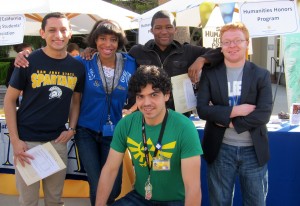Humanities Honors: After Sixty Years
“A liberal arts education experience at a large, public university”—those are the words used to describe San José State University’s Humanities Honors Program. On October 3, the program celebrated its sixtieth anniversary. Founded in 1954 by four Humanities professors—Rex Burbank, Jack E. Fink, O.C. Williams, and Richard Tansey—the Humanities Honors Program was designed as a multi-disciplinary academic experience that would be team-taught in both lecture and seminar settings. Over the years, the program has evolved into the current four-semester experience that enables students in the program to fulfill general education requirements while bonding with both peers and professors in a close-knit group experience.
Members of Humanities Honors are the cream of SJSU’s crop. To apply, students must have a 3.0 unweighted GPA in high school and one of the following: a 550 or above on the SAT Critical Reading, a 24 or above on the ACT Verbal, a 3 or higher on the English AP exam, or a 150 or above on the English Placement Exam. The program is open to all majors. Students, however, must come prepared and, as the Humanities Honors literature states, “willing to work with integrity.” The twenty-four unit curriculum covers various areas of study, including religion, history, government, literature, music, and art. Satisfying requirements in nine general education areas, the program is ideal for a student in any major, either complementing a humanities major or diversifying an engineering major’s course load.
Professor Cynthia Rostankowski, the current Humanities Honors program director, still preserves the founders’ legacy of teaching hard-working students. The first noticeable object in Rostankowski’s office is her inflatable model of Edvard Munch’s The Scream on the top of her filing cabinet. But, it contradicts her personality completely. With a soft-spoken enthusiasm in her voice, she talks about the program: “By means of their engagement with one another, the students come to understand much more deeply the material that was covered, material that was the foundation for much of their educational life.”
Since 1954, the program has morphed into something with a more global focus. As Rostankowski states, “We have become more diverse, especially in the past fifteen years. We are all part of the world. How do we see ourselves in that community?”
Debby Ng, a junior Liberal Studies major intending to enter the field of elementary education, echoes Rostankowski with her experiences. “The Honors program is the best part of my major because it gave me a broad sense of the world.” Ng’s favorite Humanities Honors course, Hum 1A, reflects the program’s global-centric curriculum: “We went all around the world and learned about all of the ancient civilizations. It gave me a really good overall introduction to the beginning of humanity.”
The Honors program coursework is not the only element that engages pupils. Because students in the program take the same classes, they begin to bond with each other, developing a close-knit group that can form friendships for life. In fact, Debby became roommates with one member of her Humanities Honors cohort. She cites the program for bringing the two of them together.
Not only do students form bonds with each other, they form them with their professors. Ng sings their praises, observing the expertise evident in each one’s field of study: “All of the professors are experts. From literature to music to art history, they all know their stuff.”
The Humanities Honors Program maintains a great balance between retaining tradition and growing to suit today’s students. Just this year, the program rolled out a third-year experience that is open to transfer students as well as those who came to SJSU as freshmen.
With SJSU expanding every year, the Humanities Honors Program has proven to be a challenging yet comforting addition to the lives of the students, and it truly is a jewel in the crown of the university. So here’s to sixty more years of rigorous study and a close-knit community that will produce great citizens for the future!
By Jessica Keaton



